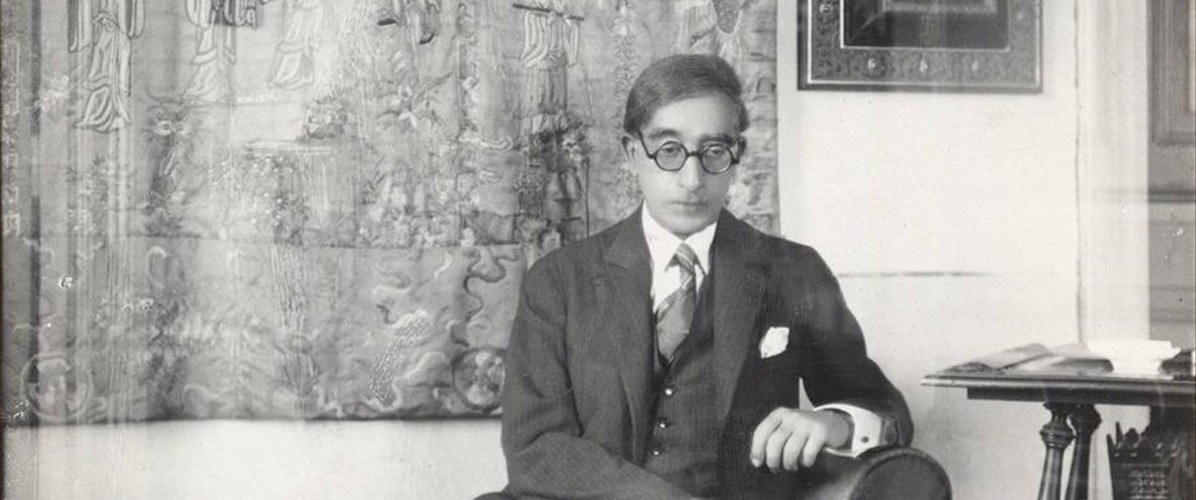C.P. Cavafy (Constantine Cavafy) is widely considered the most distinguished Greek poet of the twentieth century. He was born in Alexandria of Egypt and lived there most of his life. other than some short breaks when he lived in Constantinople. He was the last out of nine children.
Cavafy’s Greek parents had settled and lived in Alexandria, Egypt since the mid-1850s, and that’s where Cavafy was born in 1863. His father was an importer-exporter and died in 1870. The business he left in Alexandria was not sufficiently profitable for Cavafy’s mother and eight siblings so the family moved to Liverpool, UK, where the eldest sons assumed control of the family’s business operations there.
Cavafy lived in England for several years. There he discovered the works of William Shakespear and Oscar Wilde, and also developed a command of the English language. It’s understood that Cavafy’s older brothers mismanaged the family business in Liverpool, and Cavafy’s mother was forced to move the family back to Alexandria, where they lived until 1882.
Cavafy’s mother, sensing danger, moved the faimly to Constantinople with Cavafy and the rest of her children. Cavafy remained in Constantinople with his mother until 1885 after many of his brothers had returned to Alexandria. At this time, Cavafy – a teenager now – was writing poems, preparing for a career, and discovering the homosexual orientation that would inform much of his later poetry. Cavafy eventually moved to Alexandria and found work as a newspaper correspondent and later on, in the late 1880s, he got a position at the Egyptian Stock Exchange, where he worked for a few years before becoming a clerk at the ministry of Public Works. Cavafy stayed at the ministry of Public Works for the next thirty years, eventually becoming its assistant director. Cavafy retired from the minstry in 1922, and eventually died of cancer in 1933.
During his lifetime Cavafy was an obscure poet, living in relative seclusion and publishing little of his work, and instead choosing to circulate his poems among friends. He privaeyl printed a short collection of his poetry in the early 1900s and then he reprinted it with new verse a few years later, but that was really the extent of his published poetry.
This lack of concern for publication was most likely due to the highly personal nature of many poems. Cavafy, who was a homosexual, wrote many personal and sexually explicit poems which would not fare well with the society at the time. Auden noted that: “The erotic world Cavafy depicts is one of casual pickups and short-lived affairs…”
Cavafy’s works include philosophical, historical, and erotic (sensual) poems. After Cavafy’s death Xenopoulos was the first one to praise Cavafy’s poems in Athens. In the meantime E. M. Forster who served in Alexandria in the first World War and knew the poet, translated some of his poems in English and published an article in the Athenaeum. G. Seferis, W.H. Auden, C.M. Bowra, Marguerite Yourcenar and many others refered to his work writing books and critical essays about it.
“Και τώρα τι θα γενούμε χωρίς βαρβάρους. Οι άνθρωποι αυτοί ήσαν μια κάποια λύσις.”
“Now what’s going to happen to us without barbarians? Those people were a kind of solution.”
Waiting for the Barbarians – C.P. Cavafy
Ἰθάκη
Σὰ βγεῖς στὸν πηγαιμὸ γιὰ τὴν Ἰθάκη,
νὰ εὔχεσαι νἆναι μακρὺς ὁ δρόμος,
γεμάτος περιπέτειες, γεμάτος γνώσεις.
Τοὺς Λαιστρυγόνας καὶ τοὺς Κύκλωπας,
τὸν θυμωμένο Ποσειδῶνα μὴ φοβᾶσαι,
τέτοια στὸν δρόμο σου ποτέ σου δὲν θὰ βρεῖς,
ἂν μέν᾿ ἡ σκέψις σου ὑψηλή, ἂν ἐκλεκτὴ
συγκίνησις τὸ πνεῦμα καὶ τὸ σῶμα σου ἀγγίζει.
Τοὺς Λαιστρυγόνας καὶ τοὺς Κύκλωπας,
τὸν ἄγριο Ποσειδώνα δὲν θὰ συναντήσεις,
ἂν δὲν τοὺς κουβανεῖς μὲς στὴν ψυχή σου,
ἂν ἡ ψυχή σου δὲν τοὺς στήνει ἐμπρός σου.
Νὰ εὔχεσαι νά ῾ναι μακρὺς ὁ δρόμος.
Πολλὰ τὰ καλοκαιρινὰ πρωϊὰ νὰ εἶναι
ποὺ μὲ τί εὐχαρίστηση, μὲ τί χαρὰ
θὰ μπαίνεις σὲ λιμένας πρωτοειδωμένους·
νὰ σταματήσεις σ᾿ ἐμπορεῖα Φοινικικά,
καὶ τὲς καλὲς πραγμάτειες ν᾿ ἀποκτήσεις,
σεντέφια καὶ κοράλλια, κεχριμπάρια κ᾿ ἔβενους,
καὶ ἡδονικὰ μυρωδικὰ κάθε λογῆς,
ὅσο μπορεῖς πιὸ ἄφθονα ἡδονικὰ μυρωδικά.
Σὲ πόλεις Αἰγυπτιακὲς πολλὲς νὰ πᾷς,
νὰ μάθεις καὶ νὰ μάθεις ἀπ᾿ τοὺς σπουδασμένους.
Πάντα στὸ νοῦ σου νἄχῃς τὴν Ἰθάκη.
Τὸ φθάσιμον ἐκεῖ εἶν᾿ ὁ προορισμός σου.
Ἀλλὰ μὴ βιάζῃς τὸ ταξείδι διόλου.
Καλλίτερα χρόνια πολλὰ νὰ διαρκέσει.
Καὶ γέρος πιὰ ν᾿ ἀράξῃς στὸ νησί,
πλούσιος μὲ ὅσα κέρδισες στὸν δρόμο,
μὴ προσδοκώντας πλούτη νὰ σὲ δώσῃ ἡ Ἰθάκη.
Ἡ Ἰθάκη σ᾿ ἔδωσε τ᾿ ὡραῖο ταξίδι.
Χωρὶς αὐτὴν δὲν θἄβγαινες στὸν δρόμο.
Ἄλλα δὲν ἔχει νὰ σὲ δώσει πιά.
Κι ἂν πτωχικὴ τὴν βρῇς, ἡ Ἰθάκη δὲν σὲ γέλασε.
Ἔτσι σοφὸς ποὺ ἔγινες, μὲ τόση πείρα,
ἤδη θὰ τὸ κατάλαβες ᾑ Ἰθάκες τί σημαίνουν.
Ithaca
As you set out for Ithaca
hope your road is a long one,
full of adventure, full of discovery.
Laistrygonians, Cyclops,
angry Poseidon don’t be afraid of them:
you’ll never find things like that on your way
as long as you keep your thoughts raised high,
as long as a rare excitement stirs your spirit and your body.
Laistrygonians, Cyclops,
wild Poseidon you won’t encounter them
unless you bring them along inside your soul,
unless your soul sets them up in front of you.
Hope your road is a long one.
May there be many summer mornings when,
with what pleasure, what joy,
you enter harbors you’re seeing for the first time;
may you stop at Phoenician trading stations
to buy fine things,
mother of pearl and coral, amber and ebony,
sensual perfume of every kind
as many sensual perfumes as you can.
Μay you visit many Egyptian cities
to learn and go on learning from their scholars.
Keep Ithaca always in your mind.
Arriving there is what you’re destined for.
But don’t hurry the journey at all.
Better if it lasts for years,
so you’re old by the time you reach the island,
wealthy with all you’ve gained on the way,
not expecting Ithaca to make you rich.
Ithaka gave you the marvelous journey.
Without her you wouldn’t have set out.
She has nothing left to give you now.
And if you find her poor, Ithaca won’t have fooled you.
Wise as you will have become, so full of experience,
you’ll have understood by then what these Ithakas mean.
As a stylist Cavafy was atypical. His language was flat, his delivery direct, whether he was writing about mortality, beauty, or despair; and whether he was writing about eroticism, the past, or the anxiety-inducing present. Cavafy used neither Greek nor Western European models. According to most experts his poetic style was his own invention.
Cavafy’s most acclaimed poems are “Waiting for the Barbarians” and “Ithaca”.
In “Waiting for the barbarians” the leaders in ancient Greece are preparing to offer their land to the barbarians only to discover that the barbarians, so necessary to political and social change, no longer exist. In “Ithaca” the poet evokes Homer’s Odyssey in stressing the importance of the journey over the destination.
Finally, Cavafy’s erotic poems treat themes similar to those addressed in his historical verses.


